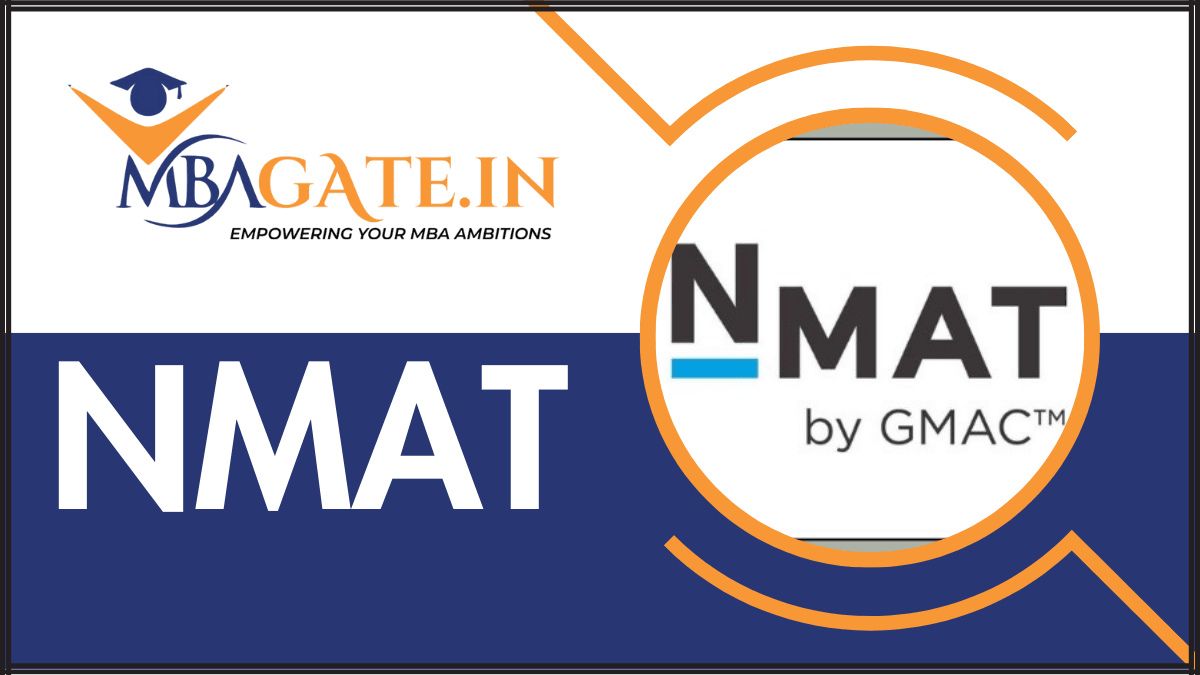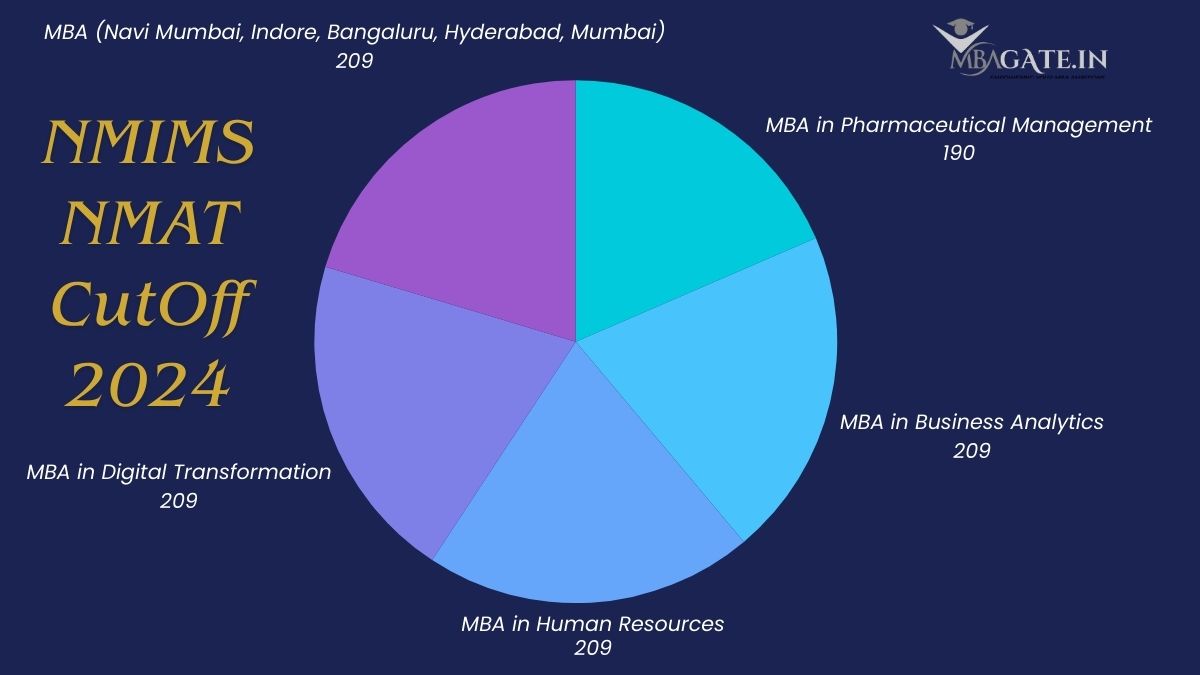NMAT Exam 2025
Table of Content
-
- + more items Show less
The registration for NMIMS Management Aptitude Test also known as NMAT Exam started on August 1, 2025. This popular MBA entrance exam is conducted by the Graduate Management Admission Council or GMAC and will be held across 86 test centres in India.
Every year, NMAT is taken by students aiming for admission to top postgraduate management programs in India. The exam is considered easier than the CAT so students preparing for CAT usually find NMAT manageable as well. More than 50+ reputed Business schools in India accept the scores of NMAT exam to shortlist students for their MBA programs.

What is NMAT?
The NMAT exam officially called the NMIMS Management Aptitude Test is a national-level test conducted by GMAC. Candidates can apply their NMAT scores to get admission in NMIMS Mumbai, its campuses and other leading MBA colleges. It should be noted that the NMAT exam which was previously organised by NMIMS, Mumbai is currently administered by GMAC.
One primary attempt plus two retakes is the maximum number of times you can take the exam.
There must be a 15-day interval between attempts.
The exam runs within a 44-day test window and candidates can choose their own exam date and time.
NMIMS Mumbai, S.P. Jain School of Global Management Mumbai, ISB, VIT University, ITM Business School, KJ Somaiya Institute of Management, IFMR SRM University, UPES, and IFIM College are a few of the institutions that recognise NMAT results. Candidates need the scorecard of the NMAT Exam by GMAC for admission into these top business schools.
Significant Highlights of NMAT Exam 2025
NMAT Important Dates 2025, 2024 & 2023
NMAT Registration Dates 2025
Programs Offered by Colleges Accepting NMAT Scores 2025
Eligibility For NMAT Exam 2025
The Graduate Management Admission Council conducts NMAT 25 and sets the eligibility rules every year. Candidates must meet the following criteria to appear for the exam

Colleges Accepting NMAT Scores 2025
NMAT Exam Syllabus & Pattern 2025
An outline of the NMAT 25 exam
Exam Format: Online in CBT Format
Duration- 120 minutes or Two Hours
Total Questions- 108 questions in all
Total Marks- 360
Question Type- Multiple-choice with 4 possible answers
Marking Scheme- +3 marks for every correct answer and there is no negative marking in the exam.
Sections of the NMAT 25 and Time Allocation
NMAT 2025 Syllabus
1. Language Skills
Topics included in this section of the NMAT exam are-
Reading Comprehension including RC passages, word meanings and summaries.
Grammar including tenses, sentence correction, parts of speech and idioms.
Vocabulary includes synonyms, antonyms and analogies.
Sentence-based questions having para jumbles, odd one out, fill in the blanks, jumbled sentences and error spotting.
2. Logical Reasoning
This section tests your reasoning ability through verbal and non-verbal questions. Topics include:
Analytical reasoning has puzzles, coding-decoding, input-output and direction sense.
Verbal reasoning topics include statements, assumptions, conclusions and decision making.
Visual/figure-based reasoning
Blood relations, calendars, clocks, analogy
3. Quantitative Skills
Topics include in this section of the NMAT exam 2025 are
Arithmetic - Percentages, ratios, averages, time & work, simple & compound interest
Algebra & Equations - Linear, quadratic, inequalities
Number Theory - Factors, multiples, remainders, divisibility rules
Modern Math - Probability, permutations & combinations, set theory
Data Interpretation - Tables, bar graphs, pie charts, line charts, mixed graphs
Other Topics - Logarithms, surds & indices, LCM & HCF, unit digits
Registration For NMAT 2025 by GMAC
Go to mba.com/nmat and create your NMAT account with a valid email.
Enter your information in the Manage NMAT Profile section.
Verify your email - check spam/junk if not received; you can resend it.
Log in to the Candidate Dashboard.
Complete the application form with name and DOB must match your photo ID.
Select up to 5 schools to send your scores as extra schools cost ₹400 + taxes.
Upload a recent photo that matches your ID for verification and it should be no more than 6 months old.
Pay the registration fee. For help - email nmatsupport@gmac.com
Scheduling the NMAT 25 Exam
After payment go to the Candidate Dashboard - Book Exam Slot.
Choose the mode for the Test Centre.
Select the country, city and centre as well as the time and date that work best for you.
Agree to the policies and confirm.
Download your admit card 7 days before the exam.
NMAT Exam Retakes
You can attempt the NMAT exam up to 3 times in a year consisting of 1 main attempt + 2 retakes.
The retake option opens after your last attempt. Pay the fee and book again.
Gap rules are that if the scorecard shows a valid score - the next attempt is after 15 days and if the scorecard shows No Show/NDA Refused/Exam Incomplete - reschedule after 24 hours.
NMAT Exam Admit Card 2025
Go to the official website of NMAT by GMAC – nmat.org.in. You’ll also get a link in your registered email after completing the application form.
Select the "Download NMAT by GMAC 2025 Admit Card" option.
Enter your ID of NMAT and password to log in.
After logging in click the link to download the admission card. The PDF version of your admit card will show up on the screen.
Download and print the admit card. Keep extra copies for safety.
Note- Print your admit card a few days before the exam to avoid last minute issues. If you are taking a retake exam in 2025 you don’t need to redownload it.
NMAT 2025 Exam Result
Within 48 hours of your test your NMAT results are made public. You can view and download it at the official NMAT by GMAC website.
How to View and Download NMAT 25 Results by GMAC Exam
Click on the "Result" option after visiting the official NMAT by GMAC website.
Login using your username, password and date of birth which are the same credentials that are used during registration.
Submit the security code that appears on the screen.
After logging in click on the NMAT results tab to view and download your scorecard.

NMIMS NMAT CutOff 2024
NMAT Admission Process 2025
The NMAT selection process 2025 has multiple stages after the exam. Participating institutes conduct these rounds individually as per their own schedules.
1. Case Discussion
Some institutes replace GD with a Case Discussion.
Here, candidates are given a case or situation to analyse and discuss.
Students must contribute at least 2 - 3 meaningful points within about 15 minutes.
2. Personal Interview
Conducted by a panel of faculty members and industry experts.
Questions are asked on management, current affairs and global issues.
This round assesses subject knowledge, confidence and overall personality.
Final Selection Criteria
When making final admissions decisions, B-schools take into account a variety of factors:
NMAT score for 2025
GD/CD performance
PI performance
Academic history
Experience at work (if any)
Diversity in academia and gender
FAQs
The NMAT exam is taken online in computer-based mode. It is 2 hours long and contains 108 questions categorised into three sections - Language Skills, Logical Reasoning and Quantitative Skills with 36 questions in each section. A correct answer is awarded three marks and there is no negative marking.
The cost of NMAT 2025 exam fees is ₹3000 plus tax. In case a student wishes to retake the test the cost is once more ₹3000 plus tax per attempt. The fee to reschedule is ₹1200 plus tax and sending scores to more than five schools involves an extra charge of ₹400 plus tax for each additional report.
NMAT scores are recognised by NMIMS Mumbai and its other campuses along with various well-known institutions like SP Jain Global, ISB for its Advanced Management Programme, KJ Somaiya, VIT University, XIMB, IFMR SRM, UPES, ICFAI and numerous others located throughout the nation.
Shortlisted candidates are called for subsequent rounds of selection which may consist of a Group Discussion or Case Discussion and a Personal Interview. Final admission is on a holistic basis combining NMAT score, GD or CD performance, interview, academic background, work experience and academic or gender diversity.






